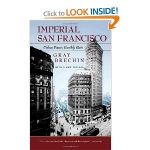
McClatchy columnist Dan Walters chased the unicorn yesterday, but didn’t bag it. Walters lit into the city of San Francisco with the purpose of exposing its long record of hypocrisy on the environment. Trouble is, San Francisco, aka “The City,” is as much a product of myth and fantasy as the one-horned white horse, and twice as paradoxical.
Supposedly the seat of white-wine drinking lovers of seldom-seen fish and endangered bugs, San Francisco has always put the bottom line before the environment, but that just means it’s like any other city.
It’s never made any sense to chase the myth anyway. Once the fog rolls in, San Francisco fades into fantasy. The only way to really appreciate San Francisco is through the history of its movers and shakers, and what a history it is.
Gray Brechin’s Imperial San Francisco is as good a place as any to begin. Brechin penetrates the fog by recounting the stories of The City’s founders. Everyone’s heard of Hearst and the de Youngs, but the scope of their (mis)deeds and achievements is better appreciated through the lens of history than through the distorted prisms they themselves helped construct.
Add the names Spreckles and Crocker to the constellation of San Francisco luminaries and you’re just beginning to understand the imperial substructure of Herb Caen’s “Baghdad by the Bay.” It’s critical to understand that from the beginning, San Francisco’s titans of industry just didn’t own businesses: They owned the media as well.
Hearst, the de Youngs, and Spreckles all owned newspapers outright, and even when they competed with and slandered one another publicly, they profited from a clandestine network of partnerships and business deals that made them wealthy beyond imagining.
Today, San Francisco’s movers and shakers are still shrouded in fog and mystery, but Walters did name at least one prominent current-day player in San Francisco’s fantastic history: Senator Dianne Feinstein has always enjoyed the best of both the worlds of finance and forests. Walters noted accurately that Feinstein was among the leaders in the recent protest against restoration of the Hetch Hetchy Valley, the flooding of which broke John Muir’s heart.
But Feinstein has also been a leader in protection of desert denizens, endangered rivers, and salmon runs. Like The City itself, Dianne Feinstein is a paradoxical figure, not easily reduced to simplification and caricature.
No less an environmental titan than Dave Brower made San Francisco his headquarters for years, and the Bay Area is still the heartland of the environmental movement.
The ultimate truth about San Francisco, and about almost all great cities, is that the colossal personalities who build them learn early to use public opinion and public resources to further their purposes. Gray Brechin’s Imperial San Francisco is subtitled, “Urban Power, Earthly Ruin.” It tells a story of environmental havoc far greater than most Californians have yet realized or even imagined, and of destruction that extends far into California’s vast interior. Ironically, San Francisco may yet become the cradle from which emerges a better way forward.
